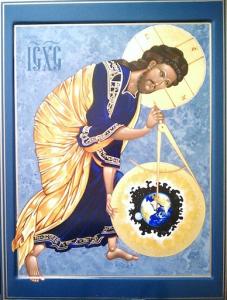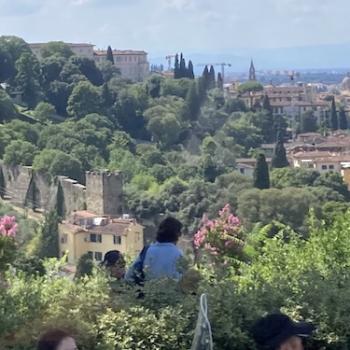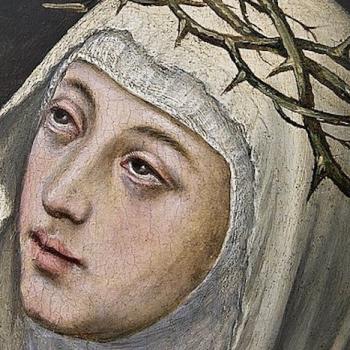
by Joseph Brown. Private Collection, 26×32, egg-tempera, gold leaf on birch board.
Theologians—especially premodern ones—often use the language of divine ideas to talk about God’s work of making a world. God is something like an architect who builds creation on a mental blueprint. (That image is rich and helpful, and also has problems. We’ll get back to it.) Some of the questions that these theologians ask hover around universals and particulars: does God have an idea called “dog,” or of my particular dog? Or both?
Is God an Event Planner?
My current favorite writer on divine ideas—if you’ve been reading this column, please act surprised—is Maximus the Confessor. He spends most of his time reflecting on the divine idea not of particulars (my dog) or universals (dogness, or the breed called “boxer”), but on conjunctions. When my dog came and greeted me at the door, wagging his entire back half, was that an idea that God put in the world?
This is closer to the language we sometimes use about God’s plan. We don’t usually ask, “was my dog in God’s plan?” But we might ask, “was my dog’s coming to live with me part of God’s plan?” When God was contemplating creation, did God imagine it that way? And then did God say, “That’s a good idea. Let’s have that”?
I want to say, first, why I think God does not have ideas. Then I want to say why I think God does. Theologians get to contradict themselves like that. If you don’t believe me, please close your browser now and spend the rest of the day reading Karl Barth.
No, God Does Not Have Ideas
One problem with taking the architect image too literally is that it fails to consider seriously the doctrine of creation out of nothing. If God is eternally having ideas, then those ideas—blueprints—are non-divine things. Neither God nor creation. And according to Athanasius, etc., those are the only two sorts of beings there are.
A related problem is that imagining God as having ideas makes prayer difficult. This theology puts us in the role of a student whose job is to guess what the teacher is thinking. (I work hard at not being that sort of teacher.) Is this in your plan? How about this? The term for this theology is voluntarism: God’s will—volition— is secret and uncontemplatable. If God is like that, I can’t really know God. I can pray that the unknowable God will be kind, but I cannot trust that the willed plan will be faithful to who God is in eternity. The God of the Bible, on my reading, is more trustworthy and revealing than that.
Yes, God Does Have Ideas
There is, though, a deeper sense in which God does have ideas. Or, let’s say, God has an Idea. John calls this idea the Logos, or Word, and says it was in the beginning with God. Colossians says that all things hold together in Christ, which sounds to me something like that blueprint metaphor. God has an idea, and that idea is itself the blueprint of all creation. Let’s put it in trinitarian terms: God is eternally and joyously contemplating Godself. God is first the Contemplator, then God is the Contemplated Idea, and God is also the Spirit of Joyful Contemplation itself.
And that idea refracts into a billion objects, conjunctions, and events, when that Spirit of Joy moves God to create a world.
It’s fairly easy to imagine this refraction in the joyful moments. When my dog wags half his trunk. Or the card game my family played a few nights ago, when we decided each hand that winners and losers would have to trade funny hats. These, I’m convinced, were faithful, if partial, participations in God’s eternal idea. God’s idea definitely included those hats.
Is Everything Part of God’s Idea?
But what about the hard moments? When we find ourself passing through periods of anxiety, loneliness, physical or mental suffering, or betrayal? It is cold comfort—for me at least—to say or hear that this is all part of God’s plan. Do the moments then not refract the Logos? Are they not held together in Christ? Are they not part of God’s idea of creation?
The message of the cross, especially as Paul sees it, is that they are. Moments of true suffering are, in their essence, moments of even deeper joy. Deeper magic, as they say in Narnia. That’s not because we feel the joy more than the pain. It’s because our faith in the cross and resurrection tells us that nothing—neither death nor hunger nor sword nor any of that—can separate us from God’s idea. And if the Spirit of Joy who raised the Logos from the dead is alive in us, then all the pain and death that characterizes our mortality is not enough to break us free from God’s eternal idea.
The Moments of Creation
God does not have ideas, then. God joyfully contemplates Godself, and then creates a world of ideas from that joyful idea.
This is not a great help in deciding which routes are, and are not, part of God’s plan. It may help, though, in discerning the shape that God’s plan, or purpose, or idea, is trying to take at any particular moment. I like to imagine each moment that way, in fact. Here, in the wagging of the dog, in the wearing of hats, in the quiet morning, yes, even in the painful loneliness or the betrayal, God has spoken the idea. “Let my eternal idea that brings me such joy come into a life of its own.” And the moments come to be.
And there was evening, and morning, on the first day. And each day after.










